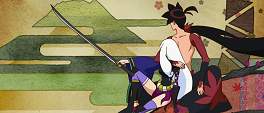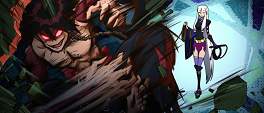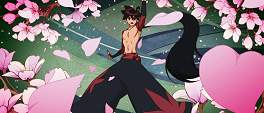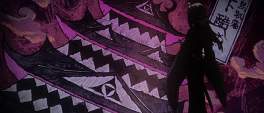There is a spacious fifty minutes to each episode of Katanagatari - enough time for sweeping, epic tales befitting of the peculiar art style and setting within feudal Japan. Disappointing then that each episode has enough content for ten minutes which is written for twenty four then stretched torturously out to fifty. Utilising every possible means to extend and protract results in great swathes of time dedicated to ceaseless banter between the two protagonists. The script may be sharp enough to prevent abject boredom and the characters just shy of caricatures, but like the recent Bakemonogatari, this isn't enough to hide deficiencies in key areas such as storyline and pacing.
Based upon a light novel series, Katanagatari follows the reclusive martial-artist Shichika Yasuri and the white haired strategist Togame as they search for twelve legendary swords forged by the master craftsman Shikizaki Kiki. After travelling to the island where Shichika has stayed all of his life, Togame explains her predicament and manages to enlist his help after one of the twelve sword's current owners attacked, endangering both her life and that of Shichika's sister. Journeying to Kyoto then to Inaba (now Tottori Prefecture) they track down the second sword, wielded by an proud swordsman still clinging to his ancestor's legacy. Despite Shichika's naivete, he and Togame begin to bond through their tribulations and a reticent respect for each other's role and specialities is born.
In the two episodes presented so far the script is both the series' greatest and most detrimental aspect. The second episode has the two protagonists wandering a bleak and featureless province, discussing the possibilities of a catchphrase for Shichika's upcoming battles for close to eight debilitating minutes. The dialogue may show a sly self-knowingness, subtly poking established genre tropes but it is undone when the most tedious of them are exploited: extended soliloquies during fight scenes and attacks thick with grandiose names are but two of the most shameless examples. An odd juxtaposition then: competent discourse with a pleasant tempo set against a genre that relies on runtime extending sloppiness. Many minutes are spent watching only talking heads followed by lengthy and drab fights which should otherwise burst with expectation.
With only a trite fetch quest as the plot, other elements are thrown into sharp relief. The aesthetics are initially jarring, moving away from detailed eyes and more accomplished shading to a more straightforward and stylised look. After two episodes it is clear that this is one of the purest interpretations of what some view as the anime ethos - exaggeration and abstraction - fitting with the calligraphic backgrounds featured in the opening. Although unique, the style could just as easily double up as a cost saving shortcut, especially blatant when the screen is filled with a monotone face and uncomplicated eyes. Asymmetric costumes and smart colour use help matters but animation is an evident afterthought with only the brief spurts of action showing any kind of flare.
Katanagatari appeals to a demographic unconcerned with trivialities such as plot, pacing and inventiveness; instead it provides the minimum required to ebb away fifty minutes. How little passion the series has is its most crucial failing. Similarly targeted shows such as Fairy Tail match their derivative nature with enthusiasm, this is a bloodless, ponderous show that survives because of its occasionally smart script. Whether the remainder of the series will bear better fruit is uncertain given the relatively fresh studio producing it and the seasoned director at the helm, for the first pair of episodes though, it squanders its generous runtime and seasoned voice actors. At half the running time, each episode would be tolerable and even verge on the entertaining, instead this is a tepid and uninspiring opening to a series afforded luxuries befitting a more creative source material.








Kudos, that's almost my entire opinion about this anime in one sentence. With such a nice art-style and 50 minute episodes, I was hoping they would actually tell a story instead of wanking around like they have been doing so. I wanted something stirring and semi-epic, instead I got a more childish Bakemonogatari.